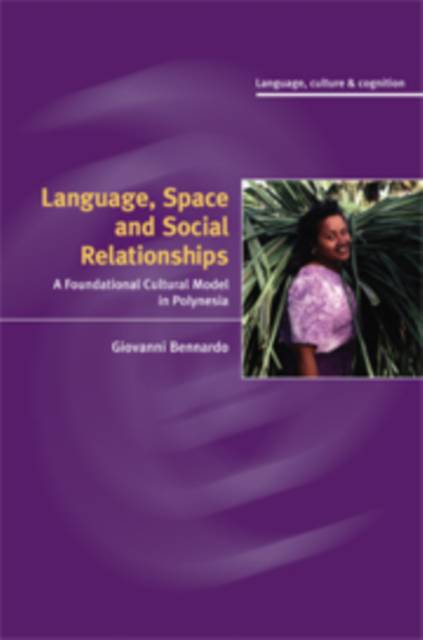
- Afhalen na 1 uur in een winkel met voorraad
- Gratis thuislevering in België vanaf € 30
- Ruim aanbod met 7 miljoen producten
- Afhalen na 1 uur in een winkel met voorraad
- Gratis thuislevering in België vanaf € 30
- Ruim aanbod met 7 miljoen producten
Zoeken
Language, Space, and Social Relationships
A Foundational Cultural Model in Polynesia
Giovanni Bennardo
€ 153,95
+ 307 punten
Omschrijving
The study of the relationship between language and thought, and how this apparently differs between cultures and social groups, is a rapidly expanding area of enquiry. This book discusses the relationship between language and the mental organisation of knowledge, based on the results of a fieldwork project carried out in the Kingdom of Tonga in Polynesia. It challenges some existing assumptions in linguistics, cognitive anthropology and cognitive science and proposes a new foundational cultural model, 'radiality', to show how space, time and social relationships are expressed both linguistically and cognitively. A foundational cultural model is knowledge that is repeated in several domains and shared within a cultural homogeneous group. These knowledge structures are lenses through which we interpret the world and guide our behaviour. The book will be welcomed by researchers and students working within the fields of psycholinguistics, anthropological linguistics, cognitive anthropology, cognitive psychology, cross-cultural psychology, and cognitive science.
Specificaties
Betrokkenen
- Auteur(s):
- Uitgeverij:
Inhoud
- Aantal bladzijden:
- 396
- Taal:
- Engels
- Reeks:
- Reeksnummer:
- nr. 9
Eigenschappen
- Productcode (EAN):
- 9780521883122
- Verschijningsdatum:
- 29/05/2009
- Uitvoering:
- Hardcover
- Formaat:
- Genaaid
- Afmetingen:
- 155 mm x 229 mm
- Gewicht:
- 748 g

Alleen bij Standaard Boekhandel
+ 307 punten op je klantenkaart van Standaard Boekhandel
Beoordelingen
We publiceren alleen reviews die voldoen aan de voorwaarden voor reviews. Bekijk onze voorwaarden voor reviews.











